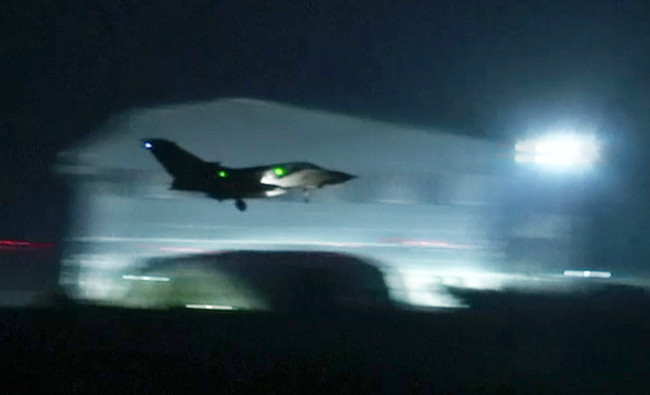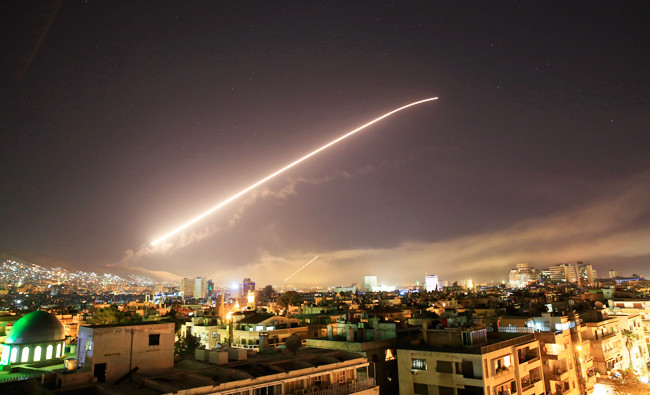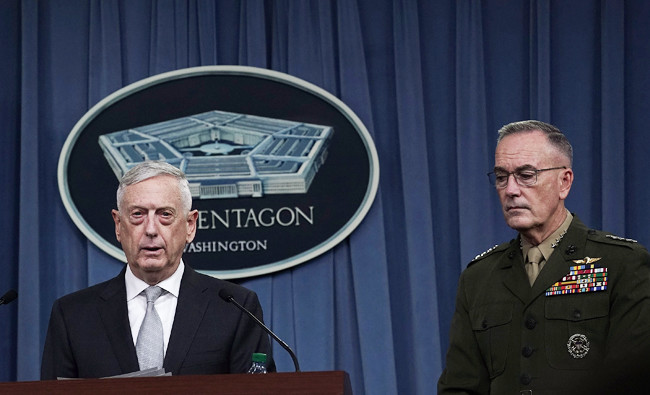BEIRUT: Loud explosions rocked Syria’s capital and filled the sky with heavy smoke early Saturday after US President Donald Trump announced airstrikes in retaliation for the country’s alleged use of chemical weapons. Syrian television reported that air defenses responded to the attack.
Associated Press reporters saw smoke rising from east Damascus and the sky turned orange. A huge fire could be seen from a distance to the east. Syrian television reported that a scientific research center had been hit.
"More than 100 cruise missiles and air-to-land missiles were fired by the US, Britain and France from the sea and air at Syrian military and civilian targets," the Russian ministry said in a statement quoted by RIA Novosti news agency, adding that "a significant number" were shot down by Syrian air defenses.
It said that 12 cruise missiles were fired at an airfield close to Damascus and all were intercepted by Syria's air defenses.
"Russian air defense systems located on Syrian territory have not been used to counter the missile strikes", it said.
It said earlier that none of the Western strikes in Syria had hit areas covered by Russia's air defenses around its Hmeimim air base and naval facility in Tartus.
The Russian military said the missiles were fired from US ships in the Red Sea as well as from tactical aircraft over the Mediterranean and by US strategic bombers from the Al-Tanf base in southeastern Syria.
“Good souls will not be humiliated,” Syria’s presidency tweeted after airstrikes began.
Trump announced Friday night that the three allies had launched military strikes to punish President Bashar Assad for the alleged chemical weapons use and to prevent him from doing it again.
The US president said the US is prepared to “sustain” pressure on Assad until he ends what the president called a criminal pattern of killing his own people with internationally banned chemical weapons. It was not immediately clear whether Trump meant the allied military operation would extend beyond an initial nighttime round of missile strikes.
Décollage, cette nuit, des forces armées françaises qui interviennent contre l’arsenal chimique clandestin du régime syrien. Déclaration du Président de la République @EmmanuelMacron : https://t.co/HNSK0FmZIO pic.twitter.com/DEAW7R50aC
— Élysée (@Elysee) April 14, 2018
Trump said the joint attack was expected to include barrages of cruise missiles launched from outside Syrian airspace. He described the main aim as establishing “a strong deterrent” against chemical weapons use.
The Syrian government has repeatedly denied any use of banned weapons.
The decision to strike, after days of deliberations, marked Trump’s second order to attack Syria; he authorized a barrage of Tomahawk cruise missiles to hit a single Syrian airfield in April 2017 in retaliation for Assad’s use of sarin gas against civilians.
Trump chastised Syria’s two main allies, Russia and Iran, for their roles in supporting “murderous dictators,” and noted that Russian President Vladimir Putin had guaranteed a 2013 international agreement for Assad to get rid of all of his chemical weapons. He called on Moscow to change course and join the West in seeking a more responsible regime in Damascus.
The allied operation comes a year after the US missile strike that Trump said was meant to deter Assad from further use of chemical weapons. Since that did not work, a more intense attack would aim to degrade his ability to carry out further such attacks, and would try to do this by hitting Syrian aircraft, military depots and chemical facilities, among other things.
The one-off missile strike in April 2017 targeted the airfield from which the Syrian aircraft had launched their gas attack. But the damage was limited, and a defiant Assad returned to episodic use of chlorine and perhaps other chemicals.
Friday’s strikes appear to signal Trump’s willingness to draw the United States more deeply into the Syrian conflict. The participation of British and French forces enables Trump to assert a wider international commitment against the use of chemical weapons, but the multi-pronged attack carries the risk of Russian retaliation.
In his nationwide address, Trump stressed that he has no interest in a longtime fight with Syria.
“America does not seek an indefinite presence in Syria under no circumstances,” he said. “As other nations step up their contributions, we look forward to the day when we can bring our warriors home.”
The US has about 2,000 troops on the ground in Syria as advisers to a makeshift group of anti-Daesh fighters known as the Syrian Democratic Forces. They are in eastern Syria, far from Damascus. A US-led coalition has been conducting airstrikes in Syria since September 2014 as part of a largely successful effort to break the Daesh grip on both Syria and Iraq.

































